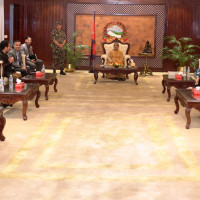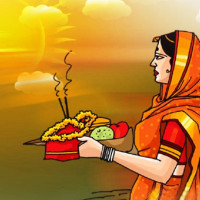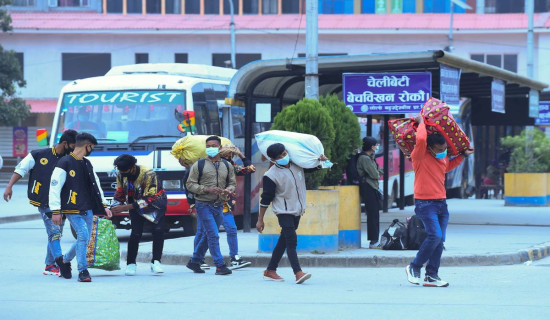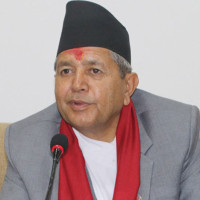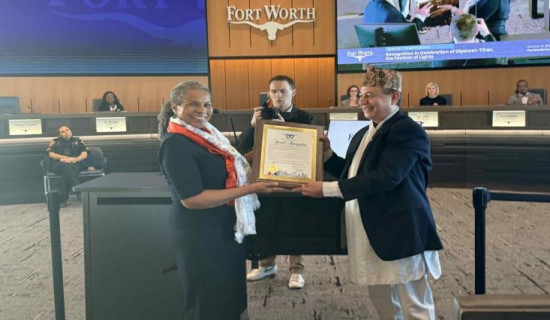- Thursday, 23 October 2025
Socio-Economic Value Of Deusi Bhailo Culture
Deusi Bhailo, also known as Dheusi or Dhyausi Bhailo, is a traditional performance that takes place during the five-day Tihar festival in Nepal, which occurs in October or November. In the tradition of Bhailo, women participate, while men of various ages engage in Deusi. These groups typically receive offerings such as flowers, fruits, sweets- sel roti, and money, collectively known as "Dakshina," which are placed on a thali or nanglo illuminated with diyas. It is widely believed that when the Deusi-Bhailo groups experience joy, it brings happiness to the goddess of wealth, Laxmi. The tradition involves the exchange of a gift of cash or a souvenir among performers, community leaders, elders, juniors, and priests. The host households provide Dakshina to the performers, who engage in dancing and singing as a symbol of blessings and fortune.
The music, dance, and customs showcased during Deusi Bhailo provide a cultural perspective to the young people of Nepal and offer them the chance to learn about and appreciate cultural heritage. This transfer of knowledge helps to maintain Nepali culture for generations to come. Deusi Bhailo, besides its cultural importance, provides a boost to Nepal's economy. The performers use the Dakshina they receive to establish community clubs, buy musical instruments, furniture, utensils, recreational tools, etc. Citizens also spend their money on new clothes, toys, foods, and gadgets during the festival.
Cultural integrity
The Deusi Bhailo tradition serves as a unifying force, fostering social cohesion during Tihar festivals and promoting cultural integrity. Through the practice of offering Dakshina, individuals demonstrate their commitment to social responsibility and generosity within their community. This tradition safeguards Nepal's cultural identity, reinforcing historical connections and establishing a shared foundation of values. Contributions to charities and religious institutions not only better society but also instill a sense of responsibility and community dedication. This collective effort not only strengthens social bonds but also cultivates a culture of altruism, inspiring individuals to aid the less fortunate and perpetuate a cycle of giving. Preserving this unique tradition is vital to maintaining a connection with Nepali heritage and roots for future generations.
Enhance social mobility
The Deusi Bhailo culture promotes social mobility by providing an opportunity for people from different economic backgrounds to participate in social events and festivals. Through Dakshina, people receive blessings and good wishes, leading to a positive long-term impact on their social and financial status.
This culture increases the chances of social and economic growth, allowing individuals to move up the social ladder. Moreover, it helps establish connections with influential members of society, providing employment and business opportunities. As a result, the Deusi Bhailo culture provides social harmony and empowers individuals to attain higher levels of social and financial success.
Financial support
The Deusi Bhailo culture also promotes economic activity, as it generates a significant flow of cash in the economy. During festivals, people spend money on new clothes, special food, and other items.
In addition to being a cultural practice, Deusi Bhailo culture also supports financial assistance to needy families, individuals, and religious institutions. During the performance, people donate money for socio-cultural and religious activities, which is used for various needs, such as maintaining the roads, schools, hospitals, temples, and providing for the needs of the local people. Furthermore, during festivals and other social events, people provide Dakshina to support the family's financial needs.
This practice is also common during funerals, mourning, and other tough times when people lend financial support to the affected families. Therefore, the Dakshina associated with Deusi Bhailo culture is a means to provide financial support and promote solidarity among community members in times of need.
The exchange of Dakshina during Deusi Bhailo plays a vital role in economic redistribution. Seniors or financially stable families offer monetary gifts to their juniors.
This act of giving helps redistribute wealth within families and communities, contributing to a more equitable economic landscape. The influx of Dakshina during the festival has a ripple effect on the local economy. Juniors often use their received money to indulge in a variety of goods, toys, cuisine, and services, contributing to increased consumption. This spending by juniors serves as a valuable economic stimulus, fostering financial circulation and supporting local businesses. The tradition of receiving dakshina during Deusi Bhailo can also serve as an educational tool to promote financial literacy among the younger generation.
The responsibility that comes with managing the received money encourages thoughtful decision-making and the development of financial skills. Juniors learn the importance of saving, budgeting, and investing wisely.
Over time, this can contribute to individuals' economic empowerment, enabling them to make sound financial choices and contribute positively to society.
Foster generosity
This culture is not only a way of preserving traditional practices and supporting those in need, but it also encourages people to be more generous and compassionate towards others. When people give Dakshina, they show their appreciation and respect for others, which helps to create a culture of mutual respect and understanding. Moreover, by supporting or sharing their blessings with those who are less fortunate, people learn to be more empathetic and understanding of others' struggles. This, in turn, promotes compassion and empathy among community members, creates a more caring and empathetic society, and thus fosters a culture of kindness and generosity.
The tradition of juniors visiting seniors to perform Deusi Bhailo and seeking blessings along with Dakshina also promotes a sense of respect, love, and gratitude within families and communities. This practice reinforces intergenerational bonds and promotes harmonious relationships. By acknowledging the wisdom and experience of elders, it creates a foundation for mutual care and support, which is essential for social cohesion and stability.
(Bhattarai is a Joint Secretary with the Government of Nepal.)




